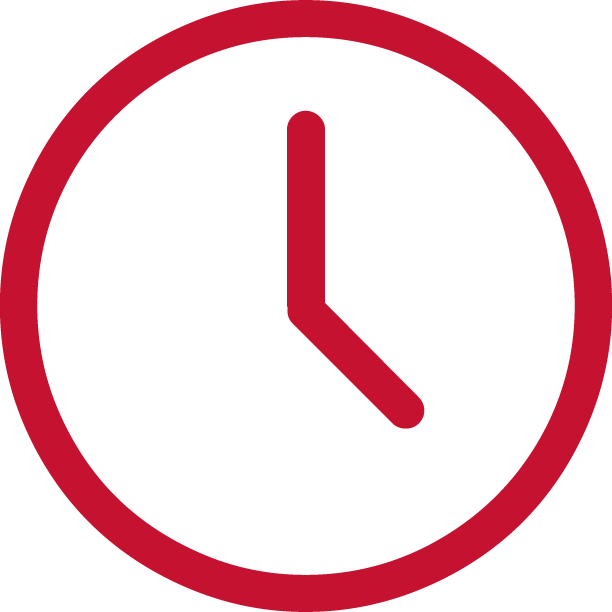SDSU’s B.S. in Computer Engineering degree completion program will help you earn a valuable degree through online courses and hands-on lab experiences in just 5 semesters.
About the program
Designed for today’s working professionals, the B.S. in Computer Engineering Degree Completion Program will help you build a foundational knowledge of computer engineering that bridges the boundary between hardware and software through a combination of theory and practice.
 Total Estimated Cost
Total Estimated Cost$592 Total Cost/Unit
 Completion Time
Completion Time Course Format
Course FormatOur WASC-accredited curriculum focuses on the fundamentals of mathematics, science, computer hardware, computer software, and engineering design. The program combines virtual lessons with hands-on labs led by experts from SDSU’s Department of Electrical and Computer Engineering within the College of Engineering. Upon graduation, you’ll have the skills you need to launch a career as a computer engineer or pursue a graduate degree in the field.
And with the majority of the program taking place online, you’ll be able to work towards your degree without putting your professional life on hold.
What's a Degree Completion Program?
This degree completion program is specifically designed for students who have started, but not finished, their four-year undergraduate degree. If you've completed 60 transferable units, satisfied all CSU requirements, and have a 2.7+ GPA, you can earn a valuable degree from San Diego State University that fits your busy schedule.
Is This Program Right for Me?
As a student in the B.S. in Computer Engineering Program, you’ll acquire the skills you’ll need to build a career as an innovative and highly-knowledgeable computer engineer. The program is designed to help degree completion candidates enter a number of technical fields, including:
- Software development
- Computer programming
- Applications development
- Systems engineering and architecture
- Information security
- Database architecture
- Networking
Graduates of the program are involved in the design, development, manufacture, installation, and operation of general purpose and embedded computers of all sorts. You’ll focus on both hardware (i.e., the electronic circuits and devices that actually store and process information) and software (i.e., the programs that control the operation of the hardware).
You can also use our degree completion program to apply for a computer engineering graduate program at SDSU or elsewhere.
The program will help you gain invaluable hands-on experience through guided laboratory sessions on SDSU’s campus. The remainder of the program is held in virtual classroom sessions led by the same expert faculty and lecturers who teach on-campus courses in SDSU’s Department of Electrical and Computer Engineering. This means that you’ll be able to earn your degree without the need to attend all your classes in-person, making it easier to earn your degree on your schedule.
Best of all, you’ll be able to earn the same degree as SDSU’s on-campus students: a Bachelor of Science in Computer Engineering from San Diego State University.

Amazon employees are eligible to take this program. More details here!
What Can I Learn?
SDSU’s Computer Engineering program will give you the tools you need to become a highly-skilled computer engineer that’s capable of working with both computer hardware and software.
Learning Objectives
- You’ll learn how to be successful in modern engineering practice and contribute to the economies of the State of California and the nation.
- You’ll learn how to become a productive citizen with high ethical and professional standards who can make engineering and management decisions.
- You’ll gain the intellectual skills necessary to assume leadership roles in your profession.
The curriculum isn’t just theoretical. In addition to providing you with a solid foundation in mathematics, science, and the fundamentals of computer engineering, you’ll also study specific areas of the field that play a large role in the rapid growth of the technology that powers our modern world, including:
- Very Large Scale Integrated Circuits (VLSI)
- Multimedia systems
- Embedded systems
- Digital Signal Processing (DSP)
- Computer networks
- Graphical User Interfaces (GUIs)
- Object Oriented Programming (OOP)
The program is primarily focused on engineering design and teaching you how to solve open-ended problems with realistic design constraints. This overarching principle culminates in a Senior Design Capstone Course designed to demonstrate your progress throughout the program, with a focus on teamwork, design process, consideration of economic and social factors, oral and written communication, and creative thinking.
All coursework is fully accredited by the Western Association of Schools and Colleges (WASC).
Career Outcomes
Program Analysis
B.S. Graduate in Computer Engineering — Nationwide
![]()
Job Postings
Last 12 months
1,820,435
![]()
Projected Growth
Over 10 years
+17.51%
![]()
Salary Range
Average
$82,000-$112,000
Source: BLS & Burning Glass Technologies, 2020
Job Postings
Software Development
Network and Systems Engineering
Database Specialists
Electrical, Electronic, and Related Engineering
CATEORY_TITLE
Projected Employment Growth (2019-2028)
Software Development
Network and Systems Engineering
Database Specialists
Electrical, Electronic, and Related Engineering
CATEORY_TITLE
According to the Bureau of Labor Statistics, the outlook for employees holding a Bachelor of Science in Computer Engineering is bright. Employment numbers are projected to grow by more than 17% over the next decade. The average salary for individuals with an undergraduate degree in computer engineering is $97,140 for jobs across the country. In California, employment numbers are expected to grow by more than 23% over the next decade, and the average salary is $104,674
Why Should You Choose Us?
Reputation
As a graduate of SDSU’s College of Engineering, you’ll be well-positioned to stand out in a competitive workforce. According to U.S. News & World Report, SDSU’s College of Engineering is one of the top-15 engineering programs in the State of California, and the Computer Engineering program was recently ranked one of the top 50 programs in the country by the ASEE Profiles of Engineering & Engineering Technology Colleges. Our program is also fully ABET-accredited.
Hands-On Experience
Throughout the program, you'll gain invaluable laboratory experience held at SDSU’s state-of-the-art facilities. With two semesters featuring weekly on-site labs led by expert lecturers and faculty members from SDSU’s Department of Electrical and Computer Engineering, you’ll be able to back up your virtual lessons with invaluable hands-on practice.
Accessibility
At its core, the B.S. in Computer Engineering Program is a degree completion program designed for today’s busy working professionals. The vast majority of your courses will take place in virtual classrooms led by the same instructors who teach on-campus courses. The program will allow you to obtain a valuable degree from a reputable university without putting your life on hold.
Want to Learn More?
Click here to connect with SDSU Global Campus at one of our upcoming virtual events.
Submit the form below and we’ll be in touch to answer all your questions and explain the next steps in the process.
